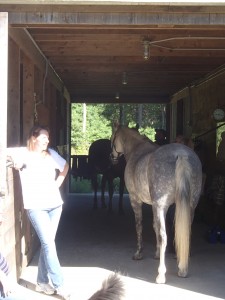
Julie Lovely. Photo Credit Margaret Bellafiore
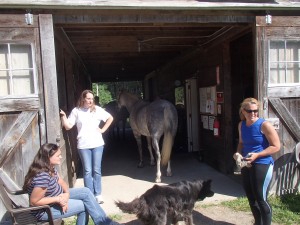
Nicole (left), Julie (middle), Jen (right) horse and dog (center) Photo credit: Margaret Bellafiore
The Lemonade People Project (2): Introducing Julie
& Her Wild Hearts Posse – Jen & Nicole
As an eleven-year old, Julie Lovely joined the “I Love Horses” club and volunteered to clean stalls at therapy riding barns in exchange for time with the animals. Horses helped her “escape the normal pains of growing up,” she said.
As a teenager, she witnessed hyper children become calm once on a saddle and a severely injured woman recovering from a traumatic brain injury (TBI) transform into a confident and carefree rider on her horse.
One boy, non-verbal and with autism, said “walk on,” his first words, to his horse. Lovely remembers the moment and how his mother cried tears of joy when it happened. “I still get chills,” she said.
Lovely knew horses had the power to heal. She didn’t know how much she would one day need that healing or how crucial equines would be to her own recovery, happiness and work.
As a young woman starting college, Lovely assumed horses would be a “side thing” done for pleasure. Fields such as Equine-Facilitated Psychotherapy (EFP) were in their infancy, she said. Plus, she was an artist. She studied graphic arts at The College of St. Rose in Albany. But just weeks before her graduation, her life and plans changed.
It was 1999 and the last thing Lovely remembers, before the fire, is being in her room, listening to music and working on her computer. She packed up and went away to visit her fiance who lived in Boston.
She returned to “bed springs and piles of melted unidentifiable objects. And that horrid, horrid smell,” she said.
She lost her final project, computer, art portfolio, clothing, furniture and all of her sentimental belongings. “There was literally nothing left,” she said.
Lovely’s roommate and friend, who was home during the fire, was not injured, but questions about the fire’s cause and location (Lovely’s bedroom) ended the friendship.
“I felt so violated,” said Lovely, “It was like someone had come in and stolen everything.”
Though shocked, Lovely assumed she would “start a new life” after graduation, when she moved to Boston to look for a job and be with her fiance as they planned their wedding.
“But that’s not what happened,” she said.
Less than a year after the fire, her mother got seriously ill. Then, her father suffered a traumatic brain injury during an auto accident. His minivan was flipped over and into a ditch and landed roof-side down.
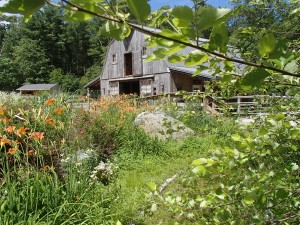
Wild Hearts barn. Photo Credit Margaret Bellafiore
Lovely, an only child was beyond rattled. She felt angry, anxious and afraid another tragedy would happen.
She no longer enjoyed making art or working on her computer. “It was almost like I didn’t know who I was after this,” she said, “as though I was watching myself go through the motions of life.”
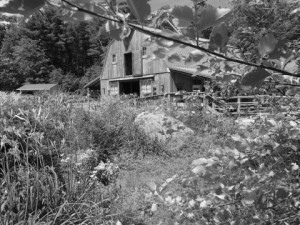
Photo Credit: Margaret Bellafiore
“I couldn’t open my eyes wide enough,” she said. “The light didn’t seem bright enough; the colors didn’t seem vivid enough.” She said it seemed as though the world were covered by a veil of grey.
“I had no idea what was wrong with me,” Lovely said. Her mother urged her to get professional help, which she did. Lovely was diagnosed with Post-Traumatic Stress Disorder (PTSD) caused by the fire and exacerbated by her father’s car accident.
Therapy, medication and family support helped, “to a point,” Lovely said but the world remained grey.
The only time color returned for Lovely was when she was with horses.
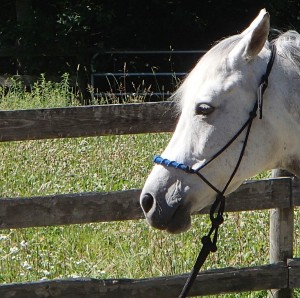
Wild Hearts Horse. Photo Credit: Margaret Bellafiore
“Horses are the only time I don’t think about anything else,” she said. She still loves the smell of the barn, the wood and hay and time tending to or working with horses.
“After the fire I really came to recognize it was one of the things that kept me grounded.”
It was an experience Lovely wanted to make sure others could share. To that end, she founded Wild Hearts Therapeutic Equestrian Program in West Bridgewater, MA, in 2009 and serves as Executive Director.
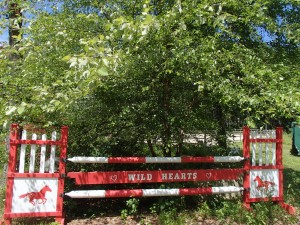
Wild Hearts Entrance: Photo Credit: Margaret Bellafiore
In May, she launched Horses for Heroes at her barn, a 10-week program for veterans, who gather to work with equines, Izzy and Kipper, under the guidance of horse handler, Jen Goddard, and therapist, Nicole Long. NOTE: Click on the the blue hyperlinks to read more about Jen and Nicole and their work with Wild Hearts.
It is “is less about talking about feelings” and more about teaching horsemanship skills, Lovely said. Lovely collaborated with Goddard and Long for over a year before rolling out the program.
“Horses are super sensitive,” said Goddard.
Goddard teaches veterans how horses naturally communicate in the wild. Horses “can smell water five miles away, feel a fly land on them, and sense a change in your heartbeat,” Goddard said. She explained that horses are responsive to the mood, body language and tone of voice of humans.
“Horses will react to what you’re feeling inside not just what you’re saying so that’s big,” said Lovely, of equine-facilitated psychotherapy (EFP).
Long believes the experiential aspect of EFP makes it effective and efficient. “Where talk therapy ends, this begins,” said Long.
In talk therapy, she explained, a client might talk about having anxiety attacks during their session but is rarely having one. In contrast, at the barn, emotions that arise while working with a horse are addressed on the spot. Long teaches breathing techniques to facilitate calmness, which helps her client and makes the horse more responsive, creating “an instant feedback loop.”
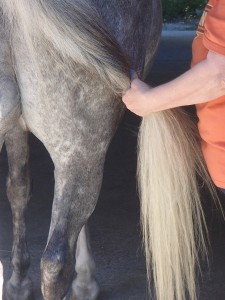
Freightner and one of the horses at Wild Hearts building trust. Photo credit: Margaret Bellifiore
“I love it. It helps me relax” said Judy Freightner who is a twenty year Army veteran with post-traumatic stress. She is one of the first participants in the Horses to Heroes pilot program.
Freightner first built trust with horses, Izzy and Kipper, by brushing them and after, by doing obstacle course exercise in the pen.
“If a person is too passive or aggressive with a horse, the horse will walk away or stay still,” said Lovely, so unless a person changes their approach they “won’t get a different result.”
Goddard “translates” the horse perspective so Freightner (and others) can understand how or why it responds the way it does.
Freightner has learned “a horse can’t pushed” and must be worked with.
“What I have learned I try to put it in my daily routine such as having more patience with people,” Freightner said.
She also said “a horse doesn’t judge” like a person might.
“We know it works,” Lovely said, about EFP. As her father recovered from his traumatic brain injury, she realized the acquisition of horsemanship skills could help veterans with a TBI as well. Learning a new skill, which uses both sides of the brain – an essential component of cognitive rehabilitation – could be done at the barn, she thought.
Lovely used her experience with PTSD and her father’s with a TBI to inform her and to create an “in the world” environment where veterans can real-life healing while gaining horsemanship skills. Lovely relies on her personal experiences and insights, with horses and trauma recovery, as well as the entrepreneurial graduate degree she earned from Babson College in 2007.
Lovely’s passion to help others fuels her. She works more than full-time hours and takes no salary. She keeps the Horses for Heroes free to veterans knowing not everyone has access to a horse. Those costs, which Lovely says are $5000.00 per person, are free to veterans due to her non-stop fundraising and the volunteer work of others and the tremendous support of Lovely’s husband and family.
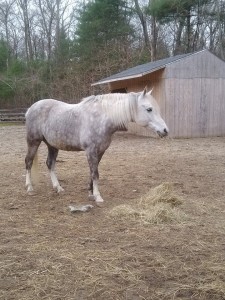 She insists she is paid just not in cash. She loves her short commute – just footsteps from her front door . She never tires of the horses or barn atmosphere.
She insists she is paid just not in cash. She loves her short commute – just footsteps from her front door . She never tires of the horses or barn atmosphere.
In fact, she was in the barn while being interviewed. Horse hair swirled around her boots as she had just brushed out her miniature horses, Jimmy and Bootsie, as Izzy (Lovely’s own horse) and Kipper (a Paint who was donated to the farm) were in the stable.
“Before I started this program I was in perpetual motion,” Lovely said, “I tried to control everything.”
Now she says, “This happened. This affected me… I have this program now to help other people. If that (trauma) didn’t happen, I probably wouldn’t.”
Lovely used to believe, “If I was stronger, I wouldn’t be like this,” but no longer sees herself as damaged. In fact, she said, “I feel like the people I’ve met who have PTSD as a result of whatever trauma they experienced…. They tend to be the most sensitive, smart people I’ve ever met.”
She understands the shame trauma survivors feel and how long and difficult recovery can be. She knows medication and talk therapy, while helpful, are not always enough.
For Lovely, time with horses remains essential because they are most effective at bringing color back to a world made gray by trauma. It’s not like I’m cured of this thing,” she said, but she has great appreciation for her work and life. The normally reserved Lovely is willing to talk about her father’s accident and recovery as well as her own diagnosis, to say “me too” to those with lives impacted by trauma.
She used to hate spring because it triggered memories of the fire. “The color of the sky, the smell of the air. I’d start to feel detached, angry, not feel myself,” she said. She would keep her windows closed, she said, to try to shut out the season.
Not anymore. Today, she opens her windows, door and heart.
Her mission is to help others learn the language of horses and hope. She helps others “walk on,” after trauma, as she does.
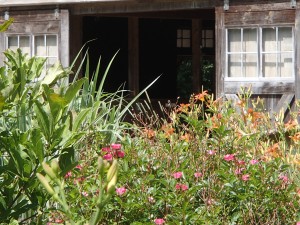
- Barn Sanctuary, Photo Credit: Margaret Bellafiore
Writer’s Personal Notes:
1)I realized after finishing my interviews with Julie, Nicole, Jen and Judy that they are all women. I didn’t set out to write an article about four fabulous women but that’s what happened.
This wasn’t intended as a “Hear us roar” feminist piece. I wasn’t writing it so people would realize women suffer from PTSD, serve in the military, handle horses, use experiential therapy or start non-profits. But they do and did.
2)The Boston Globe originally commissioned this piece, as part of a series on people overcoming adversity. The editor’s budget was cut and my  series was gutted. It hurt to lose. A lot. I was given a chance to “re-tool” the piece and make it less about Julie’s trauma recovery and more about the veterans in the Horses for Heroes program. Let me say, that will be a fabulous story, but it wasn’t the one I was writing.
series was gutted. It hurt to lose. A lot. I was given a chance to “re-tool” the piece and make it less about Julie’s trauma recovery and more about the veterans in the Horses for Heroes program. Let me say, that will be a fabulous story, but it wasn’t the one I was writing.
I tried more than once but it just wasn’t what the editor wanted. It was grueling and I lost focus and drive. After 60 hours, and no workable piece, I cut my losses. Plus, I started to hate the story which isn’t exactly how you want to feel about a “big clip.” Plus, I would have earned $3 tops by the time I was done. I couldn’t afford to spend any more time writing, interviewing and revising.
It can be a tough business.
But as the saying goes, “The story wouldn’t let me go.”I decided to finish at least one draft because I didn’t want to disappoint Julie and I didn’t want to let myself down. I didn’t know if anyone would pick up the piece but at least I could return to my original idea and focus on recovery from trauma and making meaning afterwards.
I’m so glad. Was it financially rewarding? No. Am I going to say that Oprah wants to run the piece? No. Will it hurt to see another piece in The Globe? Yup.
However, Elephant Journal will run my piece. Now there will be two stories  published about Julie and Wild Hearts. TWICE AS MANY PEOPLE will learn about the FREE Horses for Heroes program. TWICE as many will have access to trauma recovery and healing through horsemanship. More trauma survivors will know healing from trauma can be complicated but is possible.
published about Julie and Wild Hearts. TWICE AS MANY PEOPLE will learn about the FREE Horses for Heroes program. TWICE as many will have access to trauma recovery and healing through horsemanship. More trauma survivors will know healing from trauma can be complicated but is possible.
There was a pay off to be had but it didn’t come in the way I originally expected. However, the Lemonade People Project is about telling the truth about trauma and celebrating creativity and resilience. Done. Done.
Bonus: My good friend and neighbor, Margaret, who introduced me to Julie’s work, through her collaboration with Warrior Writers took amazing photos and those to are being shared. Go Margaret.
Such good people doing great work. Happy Fourth Everyone!
P.S. The piece by another reporter came out in The Globe and she did a fantastic job. Here piece is here.
Congratulations on writing a fascinating story of recovery and strength! I guess this is what is called PTG, Post Traumatic Growth.
I better understand neuroscientist Stephen Porges suggestion that PTSD can be treated by “being in the arms of a mammal.”
Margaret,
Thank you for your AMAZING photos! And I love the idea of PTG and PTG (post-traumatic resilience). Someday I want to try equine-facilitated psychotherapy.
You are so right about Porges too.
Cissy
I volunteer with horse rescue. I have witnessed and experienced human and equine healing through this work. Thank you to the author for persisting and getting this story out. So glad to see the emergence of horses as healers of trauma. There is nothing more rewarding than working with these sentient beings.
Michelle,
Thank you for writing. What a strong community of horse loving people who have witnessed and/or experienced healing with horses. It’s fabulous to hear about and I appreciate your support of my writing this story.
Cissy
Hi, I am a veteran and worked with Julie and her program when I was stationed in Massachusetts. She is amazing as well as her program and I miss her and her horses so much, I plan to go see her next month.
I now live in WI and am on the Board of Directors and am trained in equine therapy for a similar equine therapy program for Veterans and those with special needs, called Veterans Equine Trail Services (V.E.T.S). It is my passion and what I plan to do solely when I retire from the military. I know how much horses have helped me with my struggle with PTSD and all that comes with years of this fight, it has changed my world for the better. I know it can help so many more. Blessings to Julie and those who provide these services, as well as, care for these wonderful horses.
Respectfully,
Angela Joseph-Gaffke, RN
Thank you so much for writing Angela,
I have only known Julie a short while but she and the program seem fantastic. I’m glad others are getting to learn about it or be reminded that it exists. Thank you for writing and commenting. And I’m so happy to hear horses have helped with your own PTSD. We trauma survivors have lots to learn from each other. Thank you for sharing!
The V.E.T.S. program sounds amazing. Will you stay with that program or do one of your own when you retire? Thanks for the work and service you have done as well as for the work you will do when you retire. And thank you for taking the time to comment!
Cissy
please could yoiu let me know if there is anywhere i could train to help others heal by doing equine therapy in the Boston area or if not where i could go to observe this .I am over 65 and used to be a horse rider form the age of 4 to 20 .i need to get back to this wonderful world of horses and their gentle healing
6174892984 I would like to take a training in this if i can afford it and much prefer to do this as near to home as is possible
annie
Hi Anne:
I don’t know of places in the Boston area but I wonder if you contact one of the places not in Boston, but in MA, if they could guide you. I did a search of equestrian healing in MA and there are a good number of places. Cissy